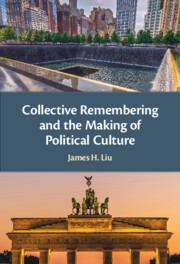Book contents
- Collective Remembering and the Making of Political Culture
- Collective Remembering and the Making of Political Culture
- Copyright page
- Contents
- Preface
- Part I Introduction to Collective Remembering
- Part II Developing a Theoretical Approach to Collective Remembering
- Chapter 4 The Organization of Collective Memory
- Chapter 5 Social Representations of World History as a Symbolic Resource: Content Informs Process in Future Making
- Chapter 6 Historiography and Human Agency
- Chapter 7 A Dialectical Approach to Collective Remembering
- Part III Idiographic Case Studies of Collective Remembering
- References
- Index
Chapter 7 - A Dialectical Approach to Collective Remembering
from Part II - Developing a Theoretical Approach to Collective Remembering
Published online by Cambridge University Press: 04 August 2022
- Collective Remembering and the Making of Political Culture
- Collective Remembering and the Making of Political Culture
- Copyright page
- Contents
- Preface
- Part I Introduction to Collective Remembering
- Part II Developing a Theoretical Approach to Collective Remembering
- Chapter 4 The Organization of Collective Memory
- Chapter 5 Social Representations of World History as a Symbolic Resource: Content Informs Process in Future Making
- Chapter 6 Historiography and Human Agency
- Chapter 7 A Dialectical Approach to Collective Remembering
- Part III Idiographic Case Studies of Collective Remembering
- References
- Index
Summary
This chapter aims to articulate a Dialectical Approach to Collective Remembering, arising from the interdisciplinary and multidisciplinary literature that has been reviewed. Some of this research is quantitative and nomothetic, but more of it is qualitative and idiographic. Some of the research originates in a bottom-up, individual-centered approach, and some originates in a top-down, societal approach. Given the diversity of the phenomena investigated under the rubric of collective memory, it does not make sense for me to develop theory in the traditional sense of theory in psychology, a discipline dominated by natural science epistemology. Rather, I prefer to develop an approach that satisfies some of the requirements of natural science epistemology, but through working in an open system. A dialectical approach to collective remembering recognizes that the object of study (collective memory) functions as a dynamic that is most powerfully conceived as containing in its current manifestation, seeds that cannot be fully grasped in the here and now, but may form part of reality in the future. It invites dialogue rather than seeking closure.
- Type
- Chapter
- Information
- Collective Remembering and the Making of Political Culture , pp. 139 - 160Publisher: Cambridge University PressPrint publication year: 2022



